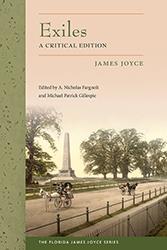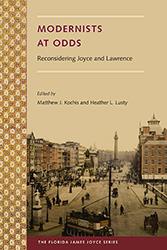This book offers a fresh look at the modernist writers, revealing how their rejection of organized religion and the colonial presence in their native countries allowed them to destabilize traditional notions of power, colonialism, and individual freedom in their texts. The result is an engaging and enlightening investigation of their writings and of the larger literary movement to which they belonged.
The Florida James Joyce Series
Edited by Sam Slote, Trinity CollegeSam Slote
Trinity College
School of English
Trinity College Dublin
Dublin D02 PN40, Ireland
slotes@tcd.ie
There are 50 books in this series.
Please note that while you may order forthcoming books at any time, they will not be available for shipment until shortly before publication date
In Up to Maughty London, Eleni Loukopoulou offers the first sustained account of Joyce's engagement with the imperial metropolis. She considers both London's status as a matrix for political and cultural formations and how the city is imaginatively represented in Joyce's work.
Opening a new dimension of Joycean scholarship, this book provides the premier study of Joyce's impact on German-language literature and literary criticism in the twentieth century.
Confronting a host of assumptions, misprisions, and prejudices, A. Nicholas Fargnoli and Michael Patrick Gillespie contend that Joyce's play, Exiles, deserves the same serious study as his fiction and stands on the cutting edge of modern drama.
This is the first Finnegans Wake guide to focus exclusively on the multiple meanings and voices in Joyce's notoriously intricate diction.
In this book—one of the first ecocritical explorations of both Irish literature and modernism—Alison Lacivita defies the popular view of James Joyce as a thoroughly urban writer by bringing to light his consistent engagement with nature.
This volume elucidates the ways Joyce wrote about his homeland with conflicting bitterness and affection--a common ambivalence in expatriate authors, whose time in exile tends to shape their creative approach to the world.
A long overdue extended comparison of two of the most compelling writers of the twentieth century.
Cóilín Owens shows that "After the Race" is much more than a story about Dublin at the time of the 1903 Gordon Bennett Cup Race: in reality, it is a microcosm of some of the issues most central to Joycean scholarship.
Though critical work has often focused on Joyce's relationship to medieval thinkers like Thomas Aquinas and Dante, Renascent Joyce examines Joyce's connection to the Renaissance in such figures as Shakespeare, Rabelais, and Bruno.











